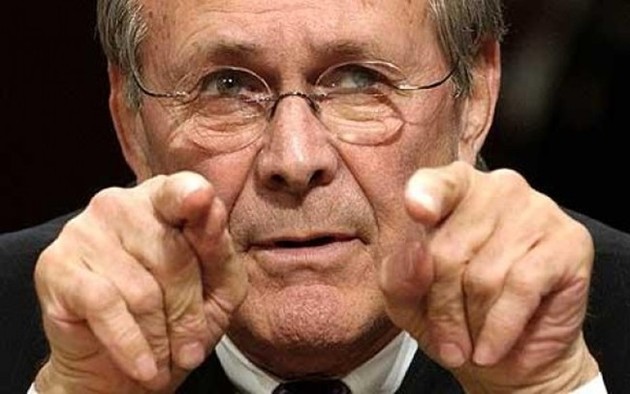Fat-necked babyhead Karl Rove spent a good part of Sunday excoriating the President for inching backwards from his line in the sand on Syria, but I’m glad Obama retreated if only a little. I know he doesn’t want a Rwanda to happen on his watch, but it’s difficult to bomb a country into a safer place. Not impossible, but difficult. Obama did what responsible adults do when they feel emotions getting the best of them: They doubt. And then perhaps they proceed or maybe they realize that strength isn’t only in being inflexible, the way JFK did after the Cuban Missile Crisis. Khrushchev sure seemed forceful when banging his shoe on a table, but even if he won a day or two with bluster, he didn’t win the history books. Certitude alone doesn’t do that.
Doubt was in short supply when Rove’s candidate, President George W. Bush, was in office. He and his inner circle knew that Iraq had WMDs, and there was no bending their spines of steel. So many people died because they had no doubt. In Errol Morris’ new Donald Rumsfeld documentary, the former Secretary of Defense still doesn’t question his decisions. From Gregg Kilday’s Hollywood Reporter interview with Morris about Rumsfeld’s desire to own the narrative even though the facts say he got owned:
“Hollywood Reporter:
You eventually interviewed him for 33 hours.
Errol Morris:
Over 11 separate days, four separate trips to Boston. We filmed in a studio in Allston over the course of a little bit more than a year.
Hollywood Reporter:
And you had him read his memos as part of the interview?
Errol Morris:
Yes, the memos are memos that he shared with us. I don’t believe they were ever available before we started talking with him. I sometimes describe it as a kind of history from the inside out rather than the other way around. What was so fascinating and still is fascinating about the memos is that they came from [various] periods, whether it was the Ford Administration or his role as an ambassador-at-large in the Middle East during the Reagan Administration and during his tenure as secretary of defense for George W. Bush. They also reflect how he wants other people to see him. They are complex. It gives some kind of insight into what he was thinking, how he wanted to present himself to others, how he wanted to present himself to history. I think there are a lot of complicated things going on that fascinated me and still fascinate me. For a lot of people when you make a movie, you’re supposed to come away with definite answers about things. I’m not sure that is my M.O. In fact, I’m pretty sure it is not.
Hollywood Reporter:
He seems strangely obsessed with the definition of words.
Errol Morris:
I’ll tell you how I interpret it. When we think of words and the definition of words, I immediately think of George Orwell because he wrote so extensively about it. Orwell was obsessed with language and how language could be used to manipulate people. But I don’t think that’s what’s going on here. It’s something stranger. Words become for Rumsfeld his own way to regain control over reality and history as he feels it slipping away. I’m not sure I’m even characterizing it correctly either, but there’s something strange and powerful about it. If somehow he gets the right word or the right definition of words, everything will be OK. America will win the war in Iraq, the insurgents will vanish. It’s all a problem of vocabulary.”

